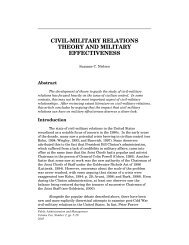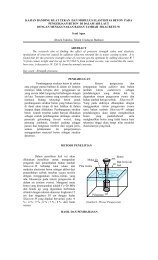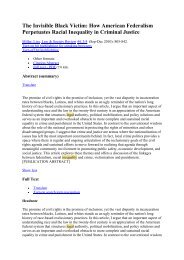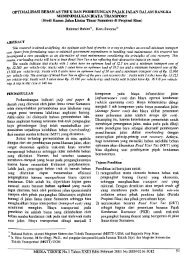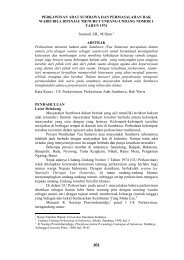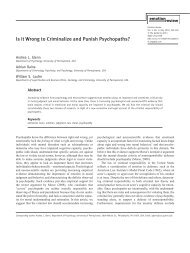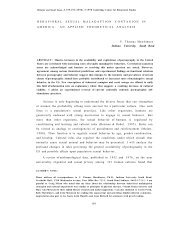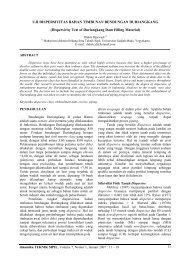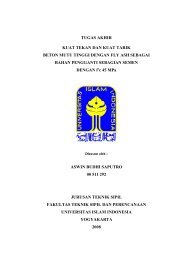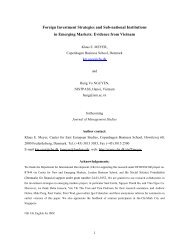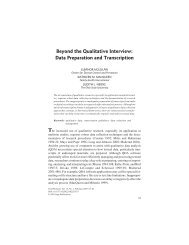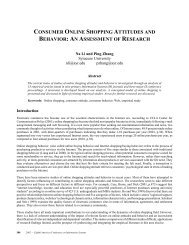Ski – resort and regional development: profile of visitors ... - E-Journal
Ski – resort and regional development: profile of visitors ... - E-Journal
Ski – resort and regional development: profile of visitors ... - E-Journal
Create successful ePaper yourself
Turn your PDF publications into a flip-book with our unique Google optimized e-Paper software.
Sustainable tourism in the small <strong>and</strong> medium tourism businesses in albania<br />
<strong>and</strong> recycling glass (45 per cent; 33 businesses). Many <strong>of</strong> these activities would appear to be<br />
established priorities <strong>and</strong> practices that do not necessarily involve owners in active <strong>and</strong><br />
innovative environmental work. Indeed, purchasing from local suppliers does not necessarily<br />
mean that the goods are derived from the local area]. The least popular activities were donating<br />
to environmental groups (3), buying organic produce (8), monitoring waste production (9)<br />
<strong>and</strong> eliminating the use <strong>of</strong> disposable packaging (10).<br />
While these results represent the general picture, levels <strong>of</strong> implementation <strong>of</strong> sustainable<br />
practices were higher in the “managed” <strong>and</strong> larger establishments than in the smaller, family<br />
run businesses. Participation levels <strong>of</strong> larger hotels exceeded those <strong>of</strong> the privately run hotels<br />
in 11 <strong>of</strong> the 17 activities assessed presumably stimulated by initiatives from head <strong>of</strong>fice rather<br />
than encouragement from the public sector. The largest size group <strong>of</strong> hotels was more likely<br />
to install water saving devices, encourage the use <strong>of</strong> public transport <strong>and</strong> purchase organic<br />
products, whereas the smaller <strong>and</strong> medium sized businesses were more likely to monitor<br />
energy, water <strong>and</strong> waste consumption, recycle cans, glass <strong>and</strong> paper <strong>and</strong> use environmentally<br />
friendly cleaning products.<br />
Effective action by the public sector to improve levels <strong>of</strong> sustainability in tourism businesses<br />
is obviously problematic. While operators recognize the environmental benefits <strong>of</strong> sustainability,<br />
they <strong>of</strong>ten do not have the time, resources or information to act on their conscience in a<br />
commercially viable way. The Environmental Monitoring Agency was attempted to overcome<br />
some <strong>of</strong> these barriers by at least providing accessible <strong>and</strong> user-friendly guidance <strong>and</strong> by<br />
demonstrating that cost-savings <strong>and</strong> market advantage could be achieved. Of the 74 businesses<br />
in the survey, only 39 per cent (29) were aware <strong>of</strong> the Environmental Monitoring Agency.<br />
Awareness levels were highest amongst the smaller establishments. A total 43 per cent <strong>of</strong><br />
small establishments (19/24) <strong>and</strong> 33 per cent <strong>of</strong> medium sized establishments (4/12) were<br />
aware <strong>of</strong> the Green Audit, in comparison with only 25 per cent <strong>of</strong> the larger businesses (2/8).<br />
This pattern was not totally unexpected as the Kit had been designed for the smaller<br />
establishments <strong>and</strong> managers from the larger businesses may not have been in the city when<br />
the Kit was promoted.<br />
PERCEIVED DIFFICULTIES OF SUSTAINABLE TOURISM<br />
Operators were also asked to consider potential problems <strong>and</strong> barriers to the introduction <strong>of</strong><br />
sustainable management practices in their business. The most common responses highlighted<br />
the importance <strong>of</strong> interest, time <strong>and</strong> cost as barriers to implementation. Two third <strong>of</strong> respondents<br />
expressed a lack <strong>of</strong> interest in environmental sustainability as a reason for their inaction (66<br />
per cent). A further 64 per cent <strong>of</strong> respondents stated that they did not have the time or energy<br />
to spend on the introduction <strong>of</strong> such practices, with 59 per cent stressing their concerns over<br />
initial financial costs. Staff <strong>and</strong> customer opposition together with external restrictions were<br />
not significant issues. However, just over half <strong>of</strong> respondents (53 per cent) recognized a lack<br />
<strong>of</strong> information as a barrier to their consideration <strong>of</strong> this issue.<br />
Tourism Today - Fall 2007 - Full Paper<br />
145



